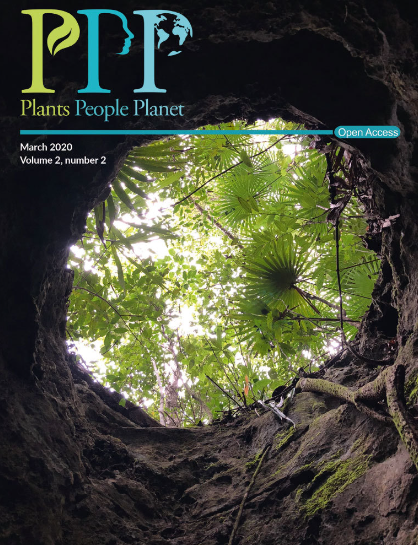对马达加斯加衍生草原的回顾:人为火灾后的低适口性可能威胁粮食安全
IF 3.6
2区 环境科学与生态学
Q1 BIODIVERSITY CONSERVATION
引用次数: 0
摘要
第26届联合国气候变化大会强调,有必要在全球变化的背景下改变对生物多样性和粮食安全产生负面影响的做法。在马达加斯加干旱引起的饥荒之后,我们的系统综述支持了马达加斯加中央高地遭受人为火灾的草原是人为衍生的理论。此外,这些过于频繁的火灾是马达加斯加中部高地草原的特征,它们选择了味道不好的草。鉴于马达加斯加依赖畜牧业作为防止作物歉收的保障,导致牧场退化的依赖火灾的做法对粮食安全和生物多样性构成了威胁。教育可以缓解未来的人道主义危机。粮食不安全状况最严重的国家预计会受到全球变化的严重影响。许多国家,如马达加斯加,依靠以牲畜为基础的畜牧业(因此有宜人的牧场)来抵御自然灾害和作物歉收。人们认识到,衍生草原可以影响气候和生物多样性。此外,建立良好的适口性-可燃性权衡预测,过度频繁的火灾选择了越来越不适口的、适应火灾的草地。2021年马达加斯加干旱引发的饥荒凸显了确定威胁粮食安全因素的必要性。考虑到每年通过景观尺度的人为火灾来准备牧场的普遍做法,我们评估了马达加斯加草原是否是衍生的,然后测试了马达加斯加最大的草原系统——马达加斯加中央高原(MCH)中日益退化和令人难以接受的牧场的火灾驱动选择。我们进行了系统的文献综述,通过确定马达加斯加草的优势品种,然后对这些品种应用功能性状和适口性评级,来评估适口性与可燃性之间的权衡。数据是用一套相关的搜索词提取出来的,在已确定的1977项研究中,有145项与提出的问题直接相关。来自审查的证据是令人信服的,因为马达加斯加高原草地的大部分是衍生出来的。此外,马达加斯加的优势禾草物种适应火灾,饲料价值较低,这表明目前的焚烧做法对生物多样性和畜牧业都产生了负面影响。在一个遭受粮食不安全的社会,人为火灾导致牧场适口性下降,这凸显了重新评估牧民焚烧做法的必要性。确定最佳火灾频率可以避免突破火灾引发的临界点,从而影响牧场的适口性和可能随之而来的人道主义危机。本文章由计算机程序翻译,如有差异,请以英文原文为准。
A review of Madagascar's derived grasslands: Low palatability following anthropogenic fires may threaten food security
The 26th United Nations Climate Change Conference emphasised the need to modify practices that negatively impact biodiversity and food security in the context of global change. Following Madagascar's drought‐induced famine, our systematic review supports the theory that grasslands of the Malagasy Central Highland that are subjected to human‐lit fires are anthropogenically derived. Furthermore, these overly frequent fires that characterise much of the Malagasy Central Highland grasslands select poorly palatable grasses. Given the reliance on pastoralism as insurance against crop failure in Madagascar, fire‐dependent practices that degrade rangeland emerge as a threat to food security and biodiversity. Education can mitigate against future humanitarian crises.Food insecurity is greatest in countries where impacts of global change are predicted to be severe. Many, like Madagascar, rely on livestock‐based pastoralism (and consequently palatable rangelands) for insurance against natural disasters and crop failure. It is recognised that derived grasslands can impact climate and biodiversity. Furthermore, the well‐established palatability‐flammability trade‐off predicts that overly‐frequent fires select increasingly unpalatable, fire‐adapted grassland. The drought‐induced Malagasy famine of 2021 highlights the need to identify factors that threaten food security. Given the ubiquitous practice of rangeland preparation through annual, landscape‐scale human‐lit fires, we evaluate whether Malagasy grasslands are derived and then test for fire‐driven selection of increasingly degraded and unpalatable rangelands across Madagascar's largest grassland system, the Malagasy Central Highland (MCH). We conducted a systematic literature review, evaluating for a palatability‐flammability trade‐off, by determining dominant Malagasy grass species, and then applying functional traits, and palatability ratings to these species. Data were extracted using a suite of relevant search terms, and of 1977 studies identified, 145 were directly relevant to the questions posed. Evidence from the review is compelling for much of the Malagasy highland grassland being derived. Furthermore, Malagasy dominant grass species are fire‐adapted with poor forage‐value, suggesting current burning practices negatively impact both biodiversity and pastoralism. Decreasing rangeland palatability caused by human‐lit fires in a society suffering food insecurity emphasises the need to re‐evaluate pastoralist burning practices. Identifying optimal fire frequencies can avert breaching fire‐induced tipping points to rangeland palatability and the humanitarian crises that may follow.
求助全文
通过发布文献求助,成功后即可免费获取论文全文。
去求助
来源期刊

Plants People Planet
Multiple-
CiteScore
9.90
自引率
5.90%
发文量
81
审稿时长
12 weeks
期刊介绍:
Plants, People, Planet aims to publish outstanding research across the plant sciences, placing it firmly within the context of its wider relevance to people, society and the planet. We encourage scientists to consider carefully the potential impact of their research on people’s daily lives, on society, and on the world in which we live. We welcome submissions from all areas of plant sciences, from ecosystem studies to molecular genetics, and particularly encourage interdisciplinary studies, for instance within the social and medical sciences and chemistry and engineering.
 求助内容:
求助内容: 应助结果提醒方式:
应助结果提醒方式:


